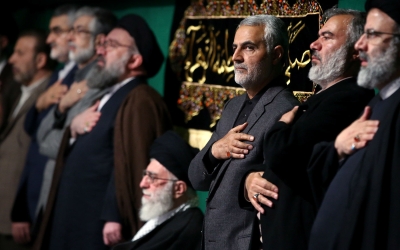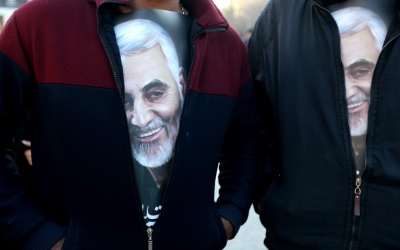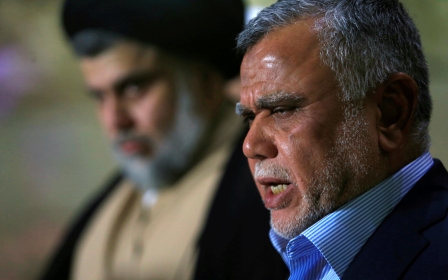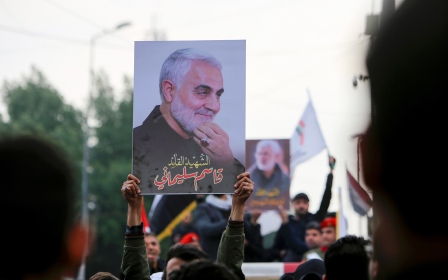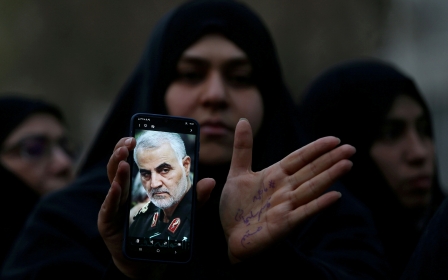Nasrallah says he feared for Soleimani’s life prior to assassination

The leader of Lebanon’s Hezbollah, Hassan Nasrallah, has shed new details about the final years and months of Qassem Soleimani's life and said that he had expressed worry for the top Iranian general's safety before he was assassinated.
In a wide-ranging four-hour interview with Hezbollah's Al Mayadeen TV, Nasrallah said he feared for Soleimani’s life in the period leading up to his 2 January killing in a US drone strike and that he had warned him repeatedly to be prudent.
'Around two months before his martyrdom… I told him Trump, his administration and their regional allies have had enough with you and I beg of you to take caution'
- Hassan Nasrallah, Hezbollah chief
“Around two months before his martyrdom… I told him [US President Donald] Trump, his administration and their regional allies have had enough with you and I beg of you to take caution,” said Nasrallah, seen with a framed photo of Soleimani on a table next to him.
Soleimani was the leader of Iran's elite Quds Force, the Iranian Revolutionary Guard Corps' overseas arm, and was the field commander for all the armed factions fighting on Tehran’s behalf abroad.
The general was killed, along with Abu Mahdi al-Muhandis, deputy head of the Hashd al-Shaabi Iraqi paramilitary group, at Baghdad airport.
Nasrallah said that prior to the withdrawal of some American troops from Iraq in 2011, the US army had threatened to target Soleimani and his forces in Iran if they did not stop their support of Iraqi armed factions.
“[The US army] designated a series of targets, including in the Gerash region, but the position of the Islamic Republic did not change,” he said.
Nasrallah also said that the US army delivered a message to Soleimani offering to help him withdraw from Iraq without coming under fire.
Soleimani is credited as the architect of much of Iran's expanding influence in recent years. He has helped direct Iranian allies and forces in countries such as Iraq, Syria, Yemen and Lebanon.
Syria and the Palestinians
Nasrallah claimed to Al Mayadeen that at the beginning of the Syrian war, Hezbollah and Iran reached out to different Syrian opposition parties to try and find a resolution to the crisis, but they were refused.
As the war escalated in 2015, and with Bashar al-Assad's forces firmly on the back foot, Soleimani travelled to Moscow to meet with Russian President Vladimir Putin, Nasrallah revealed.
“[Soleimani] met with Putin for two hours, and played a role in convincing him of Russia’s military participation [in the Syrian war] after presenting him with the reality on the ground,” Nasrallah told Al Mayadeen.
Russian intervention that year would swing the Syrian war decisively in Assad's favour.
On the Palestine-Israel front, the Hezbollah leader said Soleimani had developed relationships with all Palestinian factions, in all their differences, and had “no red lines” when it came to offering them logistical support.
Nasrallah also revealed that the Iranian general was behind the delivery of Russian-made Kornet missiles to the Hamas movement in the besieged Gaza Strip.
The same anti-tank missiles, bought from Russia by Syria, were used by Hezbollah during the 2006 war between the Lebanese group and Israel. Assad later agreed to deliver Kornets to Hamas and the Palestinian Islamic Jihad. Palestinian factions first used Kornet missiles during Israel’s Operation Protective Edge military campaign against Gaza in 2014.
“The efforts by Soleimani and the Quds Force in supporting Palestinian resistance factions were done from behind the scenes and far from the spotlight,” Nasrallah said.
Nasrallah said he met with Hamas political leader Ismail Haniyeh several times when the latter had been in Beirut this summer, where they discussed regional affairs, including the tense relations between the Palestinian movement and Damascus.
Relations between Hamas and Assad's government soured over the Palestinian movement's support for Syrian opposition groups.
“I think Hamas is heading towards re-adapting its relationship with Damascus, according to what logic dictates,” he said.
“We talked to Haniyeh about how Hamas should help set straight the directions in the region.”
'The issue of my assassination'
On the Hezbollah front, Nasrallah told Al Mayadeen that the group's members were targeted, not only by Israel but also by the US and Saudi Arabia.
“Targeting Hezbollah leaders is a common Israeli, American and Saudi goal.”
Hezbollah's secretary-general said that, based on available data, Saudi Arabia had been inciting for his assassination for a long time, “at the very least since the war on Yemen" began in 2015.
“According to our data, Saudi Crown Prince Mohammed bin Salman raised the issue of my assassination during his visit to Washington,” he said.
Nasrallah added that after the crown prince’s 2018 US visit, sources sent him warning of such plans, with information that the US was leaving it to the Israelis to carry out the assassination.
"Saudi Arabia has pledged to pay the costs of the war if it takes place,” he said.
Hezbollah's leader also said that Israel had failed to prevent the group from acquiring missiles and that it had now doubled the precision-guided missiles in its arsenal from last year.
“Any target that we want to target accurately all along occupied Palestine, we are able to hit accurately,” he said.
Nasrallah said Hezbollah had warned Israel it would retaliate against any attack, after the Israelis threatened, through a US official, to target one of the group's facilities in Lebanon’s eastern Bekaa region.
He also said that the group was still planning to retaliate for Israel’s killing of one its commanders, Ali Mohsen, in Syria in July.
Al Mayadeen at the time reported that Israel had sent a message to Hezbollah after the operation, saying that Mohsen’s killing was unintentional.
Middle East Eye propose une couverture et une analyse indépendantes et incomparables du Moyen-Orient, de l’Afrique du Nord et d’autres régions du monde. Pour en savoir plus sur la reprise de ce contenu et les frais qui s’appliquent, veuillez remplir ce formulaire [en anglais]. Pour en savoir plus sur MEE, cliquez ici [en anglais].


